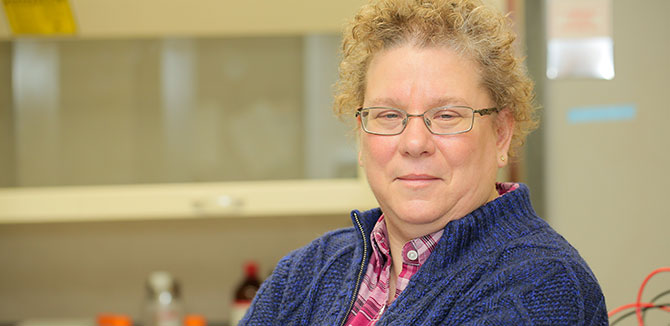Five Minutes with Gayle Woloschak
The Professor of Radiation Oncology and Radiology discusses her cancer research and what she thinks helps differentiate the Master of Science in Biotechnology program (MBP).
Gayle Woloschak is the Associate Dean for Graduate Student and Postdoctoral Affairs in The Graduate School and Professor of Radiation Oncology and Radiology at Northwestern University's Feinberg School of Medicine.
Woloschak also serves as a research preceptor for students in the Master of Science in Biotechnology program (MBP). She sat down to discuss how she's using radiobiology and bionanotechnology to develop new tools for treating cancer, as well as what she hopes MBP students learn from spending time working with her.
How do you describe your research to someone with no knowledge about radiobiology and bionanotechnology?
I usually explain it based on the goals we are trying to achieve. We are studying radiation biology to understand how radiation causes cancer at low doses; we are using bionanotechnology to develop new tools for treating and imaging cancer.
What do you think is the biggest misunderstanding about biotech?
I think that people believe that biotech will solve all problems. They expect technology will cure all diseases or solve environmental problems and that misconception leads to inappropriately high expectations.
What do you hope students who do research with you learn from the experience?
I think the most important lessons are:
- To understand what research is about and how it is done so that there is a basic understanding of concepts when one is dealing with research projects as a whole
- To determine whether this is what the student actually wants to do after leaving school; research is not for everyone, and understanding one’s interests and goals is important.
MBP obviously places a large emphasis on research for students. How important do you think it is for students to have that background as they try to enter the workforce after MBP?
Experience is much more important than book-learning. MBP students have the chance to actually gain that experience in a lab setting. This is more valuable than probably almost anything else that can be gained.
What do you think differentiates MBP from other comparable programs?
MBP offers not only a research program but opportunities for internship, which allows for diversification. In addition, I think the cadre of courses available through MBP is very high.
What advice would you give to a prospective student considering MBP?
I would advise them to work with a research team where they fit in the best. Most of the time, the research one does in the MBP program is not what the student will carry forward; it is the research experience as a whole that is important. This then means that the student should pick the best environment for him or her rather than the best project they can possibly get.


